- ENGLISH/ITALIANO
- About Us
- Courses
- Teaching staff
- Research
- Enrolment
- Student services
- Faq and Contact
- News
- Vacancies
- Work with us
The MSc Dentistry and Dental Prosthetics (MDCDP) is divided into 6 years
The fundamental educational objective is to impart theoretical knowledge and technical competences required to practice Dentistry in accordance with the common standards of EU dentistry schools. In particular, all graduates will receive an adequate and excellent education so as to practice Dentistry at the highest level, and also competences directed towards various scientific research specializations and/or similar thematic areas.
On completion of the course of study, the graduate will have gained technical knowledge and skills to take place professionally in the dental field, both public and private.
In the general aspects, the MDCDP biennium addresses the study of basic educational activities aimed at making known to the students the fundamentals of the structural organization and of the vital functions of the human body, and it comprises courses that address issues related to the relationship dentist-patient and the comprehension of the underlying principles of the scientific method. The following triennium comprises the study of disciplines of medical, surgical and specialistic interest, with special reference to clinical issues related to dental pathologies, to semiotics of the oral cavity, to the neuro-muscular disorders of the head and neck, and to oral manifestations. The educational activities are carried out in conjunction with the study of dental disciplines and with the professionalizing clinical practice. The sixth year includes a professionalizing educational activity aimed at the care of the patient with odontostomatological issues. Frontal seminar teaching is aimed at the interdisciplinary discussion of assigned clinical cases.
Language of the Programme:
Programme director: Dr Alessia Galati (alessia.galati@unicamillus.org)
Graduates of the Master Degree Course in Dentistry and Dental Prosthetics can practice the dental profession following the passing the State exam and the enrollment in the Order of Dentists.
They will be allowed to practice the dental profession in the various roles and clinical, sanitary and biomedical professional fields.
They will also be able to perform managerial activities of 1st and 2nd level in facilities of the National Health Service, in accordance with the current laws.
Job opportunities of UniCamillus students ontologically have a further international vocational outlet, with particular reference to areas of the world in which health deficiency is higher and often tragic. The Athenaeum invites to enrol young students with a strong humanitarian vocation, and who can potentially dedicate, if not all, at least part of their professional life in service of less fortunate populations of the South of the World.
Moreover, considering that many students of this University come from such countries, it will be inevitable – through precise placement actions developed by the University thanks to its international network – to supply sanitary centers of developing countries that are currently counting (a bit too much) on voluntary work of health professionals of Western countries, by trying to increase the number of local health professionals.
Courses are divided into semesters.
Integrated courses are the mandatory courses expected from the study plan. They are made of various courses, that may even be of different scientific-disciplinary areas, with the purpose of achieving a common specific educational objective.
Elective courses are carried out only in the areas of optional educational activities, and they include academic lectures and/or seminars.
Type of teaching modes. Within the courses it is defined the division of the CFUs (Crediti Formativi Universitari; “University Educational Credits”) and of the educational timing in the various forms of teaching, as follows:
Ex-cathedra lessons: It is defined as an “ex-cathedra lesson” (from now on “frontal lesson”) the discussion of a specific subject identified with a title and that is part of the educational curriculum intended for the Study Course, carried out by a Professor, according to a pre-determined calendar, and imparted to students regularly enrolled in a specific year, even divided in smaller groups.
Seminar: The seminar is an educational activity with the same characteristics of the frontal lesson, but it is carried out by more Professors simultaneously, even pertaining to different disciplinary fields (or with different competences), and, as such, it is recorded in the lesson registry. Also clinical-pathological Conferences eventually carried out in clinical teachings are recognized as seminar activities.
Professionalizing educational activity: Clinical practice activities are aimed at making the students gain specific professional skills and competences. The responsibility of planning and organizing the clinical practice devolves to a Coordinator of professionalizing educational activities, who avails of Tutors with the same professional profile or who belong to a similar scientific disciplinary field, with a consolidated professional and educational experience, assigned with roles to the didactic structure and chosen in accordance with health facilities where the educational activity is carried out. In the internship facilities, health professionals are chosen as referents/supervisors and cooperate during the conduction of the internship.
UniCamillus has an innovative laboratory for practical and professional dental activities aimed at our MSc Dentistry and Dental Prosthetics students. It also allows for the simulation of clinical activities.
The laboratory features 24 high-tech dental workstations for students, as well as a workstation for the tutor. The tutor’s workstation is equipped with a surgical operating lamp with an integrated camera, ideal for ensuring effective, direct, and precise communication during training with students. Each individual workstation is equipped with an LCD monitor capable of instantly transmitting the practical demonstrations of the tutor through the Easy-Teach software. Each workstation consists of four Smily simulators which form a circular island, enabling the tutor to carefully monitor students’ work in real-time while at the University.
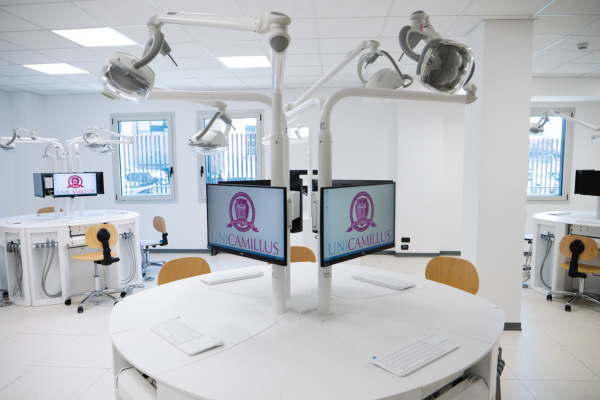
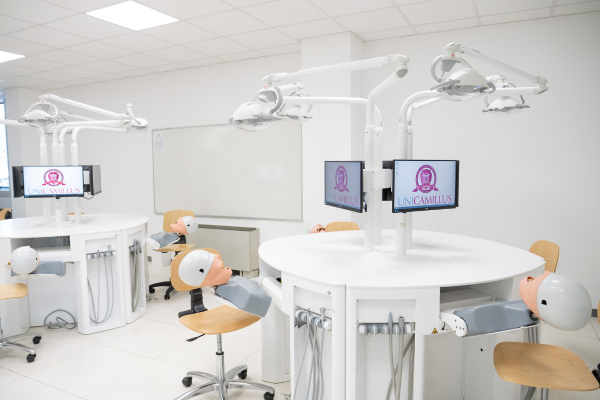
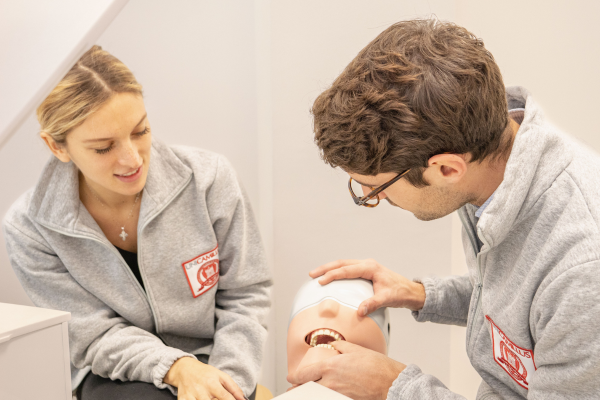
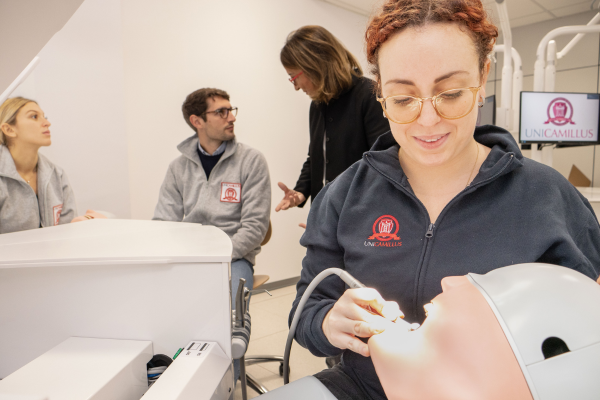
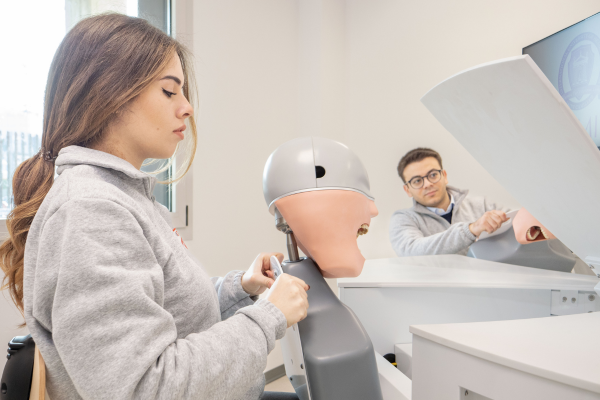
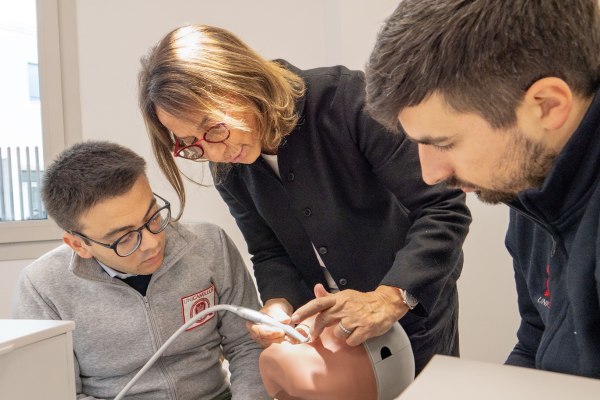
Candidates who, are willing to take the admission test must meet one of the following requirements:
In order to complete the registration to the admission test, each candidate must follow the instructions on the dedicated page and pay the test registration fee.
Candidates are admitted through an admission test. The admission procedure differs for EU and non-EU candidates.
⇒ For further details, please refer to the dedicated web page – Calls for application.
This includes all the courses (plus corresponding ECTS credits and codes) offered under the programme for the academic year and year of enrolment mentioned below:
This includes all the courses (plus name of tutor(s) and number of hours) offered under the programme for the academic year mentioned in the validated list of modules taught file below:
Our study programmes are at the heart of the University’s educational mission and are continuously being updated by the Quality Assurance Group set up for each programme.
The Quality Assurance Group is composed of the Head of School, a Programme Director, a faculty member and a student representative. The Quality Assurance Group contributes to the design, implementation and verification of all activities related to each programme, ensuring their correct and smooth running in coordination with the University’s Quality Committee and other Quality Assurance members.
During the transitional period provided for in the Statute, the Quality Assurance Group is also called upon to perform the functions normally assigned to the Review Group.
Its responsibilities include:
1) identifying potential improvements for the programme, setting deadlines and indicators to verify the degree of implementation;
2) verify the achievement of predetermined objectives or identify reasons for non-achievement or partial achievement;
3) preparation of the Annual Monitoring Sheet;
4) preparation of the Cyclical Review Report.
Quality Assurance Group for the Dentistry and Dental Prosthetics programme
“Reports from students” is the service through which UniCamillus students can report and notice on topics such as teachings or organization. It aims to promote efficient and direct communication between students and University Offices.
Contacts:
→ Reports to Programme director: alessia.galati@unicamillus.org
→ Reports to Didactic Administrative Office of the Degree Course: odontoiatria.roma@unicamillus.org
The Dentistry Degree Course secretariat answers by phone at the following times:
• Tuesday from 9.00 am to 1.00 pm
• Wednesday from 2.00 pm to 5.00 pm
• Thursday from 9.00 am to 1.00 pm
→ Request related to academic career: office@unicamillus.org
→ Requests to Student Representatives (Representatives’ task is to collect student suggestions and recommend activities to encourage students to actively participate in university life):
⇒ MSc in Dentistry and Dental Prosthetics 2023-2024 Teaching Regulations (in Italian)
⇒ MSc in Dentistry and Dental Prosthetics 2022-2023 Teaching Regulations
⇒ MSc in Dentistry and Dental Prosthetics 2021-2022 Teaching Regulations
⇒ MSc in Dentistry and Dental Prosthetics 2020-2021 Teaching Regulations
⇒ Download the regulations “Progetto di prevenzione delle malocclusioni e della salute oro-funzionale” (A.Y. 2022/2023). (in Italian)